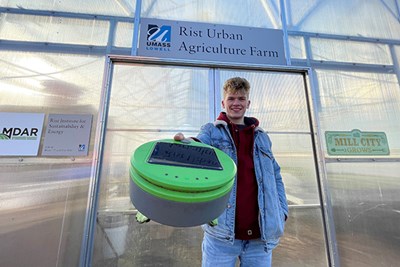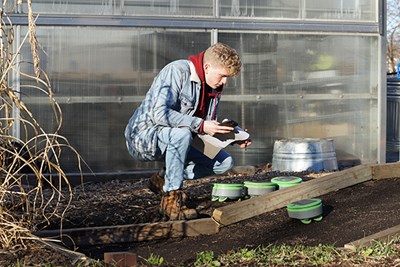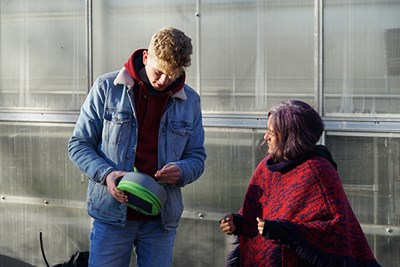Hate weeding? Engineering student helping startup devise solution
As intern with Tertill, Max Prescott tests solar-powered robot at UML greenhouse

On a sunny Friday afternoon in early December, mechanical engineering major Max Prescott takes notes as he watches a solar-powered garden weeding robot, about the size of a waffle maker, whir up a dirt incline at the Rist Urban Agriculture Farm on East Campus.
Prescott is testing the robot’s performance on slopes as part of his internship with Tertill, a startup company based in North Billerica, Massachusetts.
“It’s definitely a one-of-a-kind internship,” says Prescott, a junior from Dunstable, Massachusetts, who has been interning with Tertill since last spring. “It's nice to have a well-rounded internship that has hands-on applications.”
Equipped with a small, spinning weed whacker on its underside and sensors to help it navigate around a framed-in garden bed, the Tertill robot bears a striking resemblance to Roomba, the popular autonomous vacuum made by Bedford, Massachusetts-based iRobot. That’s no surprise, considering that Tertill was co-founded by Joe Jones, who was iRobot’s first full-time hire and helped invent the Roomba.
Jones launched Tertill via Kickstarter in 2017 and began selling the gardening robots online two years later. In September 2020, iRobot’s co-founder and former president, Helen Greiner, joined Tertill as CEO. The company has been featured in Forbes, the Wall Street Journal and Better Homes and Gardens, and sales of the $349 robot jumped more than 600% in 2020, according to Greiner.

Prescott landed the internship through a family friend who works for the company. He worked about 20 hours a week from home over the summer, testing the robot to determine the maximum area it can cover in his family’s garden (answer: about 200 square feet).
“I was scattering weed seeds all over the garden, scaling up the tests,” says Prescott, who explains that Tertill distinguishes between weeds and plants based on their height (it comes with special collars to put around new plants less than an inch tall).
When he returned to campus this fall, Prescott went to the Office of Sustainability and asked if he could continue with his testing at the Rist Urban Agriculture Farm. He was allowed to build a small test bed in the outdoor garden adjacent to the greenhouse and work there for several weeks.
“It’s great to see a student like Max working on real-world solutions right here on campus,” says Ruairi O’Mahony, executive director of the Rist Institute for Sustainability and Energy. “When we opened the greenhouse site four years ago, we envisioned it being used as a living lab for energy-efficient, sustainable agriculture projects such as this.”
Prescott, who plans to add a robotics minor, says he’s been able to apply what he’s learning in the classroom to his internship work, which he’s continued part-time during the school year.

“There’s a lot of 3D modeling, SolidWorks design and even working with barrier-detecting sensors,” he says. “A lot of the work is related to classes I’ve taken in thermodynamics and materials science. I’ve even discussed some of the work I’ve done with my professors.”
Prescott says he’s already been asked to stay on as an intern through this spring and summer, which he’s eager to do. He goes into the company’s North Billerica offices for weekly meetings with its dozen or so employees, and he enjoys the autonomy he’s given on projects.
“There aren’t a lot of strict guidelines when I get a project. They give me the opportunity to figure out how to get it done,” he says.
“There’s a lot of real-world applications that this internship has given me, which is really great,” he adds. “And it’s nice to be outside, soaking up the sun and getting some fresh air.”